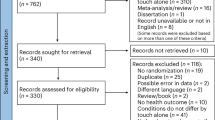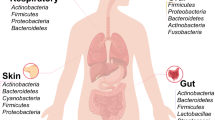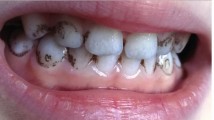Abstract
Data sources
Cochrane Oral Healths Trials Register, the Cochrane Central Register of Controlled Trials (CENTRAL) Medline, Embase, LILACS BIREME Virtual Health Library CINAHL US National Institutes of Health Ongoing Trials Register (ClinicalTrials.gov) and the World Health Organization International Clinical Trials Registry Platform databases.
Study selection
Randomised controlled trials (RCTs) including quasi-randomised and cluster-randomised trials of fluoride supplements (tablets, drops, lozenges or chewing gum) given to women during pregnancy with the aim of preventing caries in the primary teeth of their children were selected.
Data extraction and synthesis
Two reviewers independently extracted data and assessed risk of bias using the Cochrane risk of bias tool. No data synthesis was possible.
Results
Only one RCT met the inclusion criteria. There was no statistical difference in decayed or filled primary tooth surfaces (dfs) or % of children with caries at three years or five years. Risk ratio (RR) at three years = 1.46, (95% CI; 0.75 to 2.85) and RR at five years = 0.84, (95% CI; 0.53 to 1.33). At five years the incidence of fluorosis was similar between the groups.
Conclusions
There is no evidence that fluoride supplements taken by women during pregnancy are effective in preventing dental caries in their offspring.
Similar content being viewed by others
Commentary
Caries is one of the most common chronic childhood diseases and a significant public health problem. All countries are affected with decay being present in between 30-50% of five- to six-year-old children. While there have been improvements in the levels of decayed, missing and filled teeth in recent decades dental caries is a major problem.
The aim of this Cochrane review was to assess whether fluoride supplementation for pregnant women could prevent caries in their children's primary teeth.
Searching, study selection, data extraction and assessment of risk of bias have been undertaken using Cochrane's standard methodological approaches. However only one low quality randomised controlled trial involving 1400 women met the inclusion criteria. Of the 1175 children born 934 (79%) were followed up at three years and 798 (68%) at five years. No differences were seen in either the proportion of children with caries or the number of decayed or missing primary teeth.
While fluoride can be transported across the placenta altering the enamel matrix and strengthening the properties of the enamel, the exact mechanism of the transfer is uncertain. The review authors highlight than no new studies on placental transfer of fluoride have been undertaken during the past two decades. Potential risks associated with fluoride exposure have also been reported.1,2
Given the well established positive benefits of the use of topical fluorides such as toothpastes, gels, varnishes and rinses for caries prevention,3,4,5,6,7 the lack of evidence of a positive effect from the one trial that was included and little supporting evidence from other observational data discussed supports the authors' view that careful consideration should be given to future research in this area.
References
Marinho VC, Higgins JP, Sheiham A, Logan S . Fluoride toothpastes for preventing dental caries in children and adolescents. Cochrane Database Syst Rev 2003; 1: [DOI: 10.1002/14651858.CD 002278
Marinho VC, Higgins JP, Logan S, Sheiham A . Topical fluoride (toothpastes, mouthrinses, gels or varnishes) for preventing dental caries in children and adolescents. Cochrane Database Syst Rev 2003; 4: [DOI: 10.1002/14651858.CD 002782
Marinho VC, Worthington HV, Walsh T, Clarkson JE . Fluoride varnishes for preventing dental caries in children and adolescents. Cochrane Database Syst Rev 2013; 7: [DOI: 10.1002/14651858.CD 002279.pub2
Marinho VC, Worthington HV, Walsh T, Chong LY . Fluoride gels for preventing dental caries in children and adolescents. Cochrane Database Syst Rev 2015; 6: [DOI: 10.1002/14651858.CD 002280.pub2
Marinho VC, Chong LY, Worthington HV, Walsh T . Fluoride mouthrinses for preventing dental caries in children and adolescents. Cochrane Database Syst Rev 2016; 7: [DOI: 10.1002/14651858.CD 002284.pub2
Diouf M, Cisse D, Lo CM, Ly M, Faye D, Ndiaye O . [Pregnant women living in areas of endemic fluorosis in Senegal and low birthweight newborns: case-control study] [Article in French]. Rev Epidemiol Sante Publique 2012; 60: 103–108.
Sastry GM, Mohanty S, Bhongir AV, Mishra AK, Rao P . Association of higher maternal serum fluoride with adverse fetal outcomes. Int J Medicine and Public Health 2011; 1: 13–17.
Author information
Authors and Affiliations
Additional information
Address for correspondence: Luisa Fernandez Mauleffinch, Managing Editor, Cochrane Oral Health Group, School of Dentistry, The University of Manchester, JR Moore Building, Oxford Road, Manchester, M13 9PL, UK. E-mail: luisa.fernandez@manchester.ac.uk
Takahashi R, Ota E, Hoshi K, Naito T, Toyoshima Y, Yuasa H, Mori R, Nango E. Fluoride supplementation (with tablets, drops, lozenges or chewing gum) in pregnant women for preventing dental caries in the primary teeth of their children. Cochrane Database Syst Rev 2017; 10: Art. No. CD011850. DOI: 10.1002/14651858.CD011850.pub2.
This paper is based on a Cochrane Review published in the Cochrane Library 2017, issue 10 (see www.thecochranelibrary.com for information). Cochrane Reviews are regularly updated as new evidence emerges and in response to feedback, and the Cochrane Library should be consulted for the most recent version of the review.
Rights and permissions
About this article
Cite this article
Richards, D. No evidence that fluoride supplements taken during pregnancy prevent caries. Evid Based Dent 19, 73 (2018). https://doi.org/10.1038/sj.ebd.6401320
Published:
Issue Date:
DOI: https://doi.org/10.1038/sj.ebd.6401320



